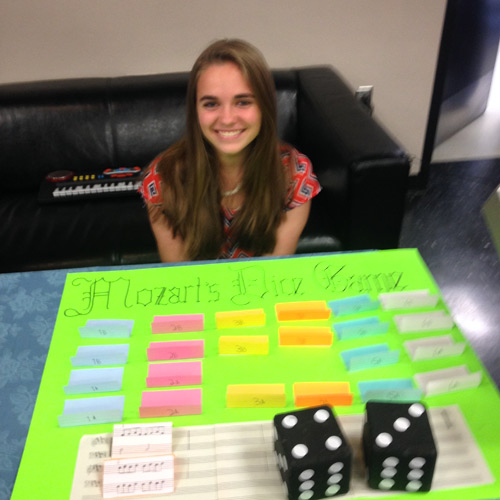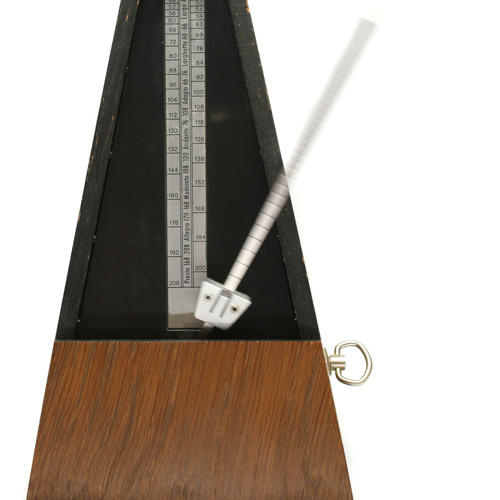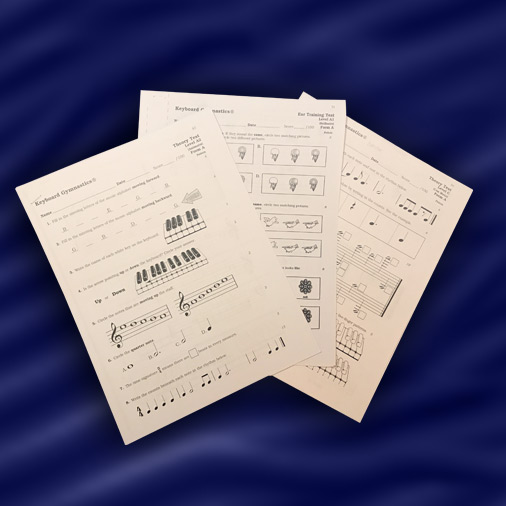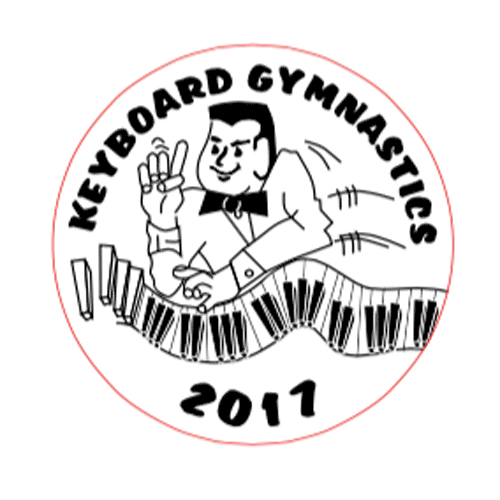Performance Event
At the performance event perform two contrasting pieces on a short recital. Students are adjudicated by 2-3 judges whose points are averaged for their final score.
COVID-19 Impact: Due to the spread of Covid-19, the Keyboard Gymnastics™ Events for 2020-21, may need to be held online, further details to follow.
Keyboard Gymnastics™ provides students a curriculum that challenges them to reach their potential in seven areas of piano study. Students are tested throughout the year in: Theory, Ear-training, Technique, Sight-reading, Performance, Ensemble, and Creative Project. Ten or more levels of study are included in each area and students are entered in each area at their individual level. Students may enter a few or all of the events. Awards and prizes are given for outstanding achievement in each event as well as for completing all seven events. Only those who enter and receive a passing score (7.0 or higher) in all seven events are eligible for the outstanding student award and the Gold, Silver and Bronze medals. In the past, prizes and awards have included cash, gift certificates, music writing software, movie passes, and an iPod or tablet.
Students who participate in Keyboard Gymnastics™ become well-rounded, proficient musicians and pianists.

At the Creative Project, Sight-reading, and Ensemble Events students create projects about a music subject which are performed or presented as a display. The display format is similar to a science fair, in that the student explains and demonstrates their project to the judges. The performance format might be an original composition, a skit, a play, a narration, etc. that is performed for the judges. A list of possible project ideas is available here. Students are adjudicated by 2-3 judges whose points are averaged for their final score.
At the Sight-reading Event students read a short music excerpt and are given a score.
At the Ensemble Event students perform a duet with another participating Keyboard Gymnastics® student, or a concerto with an accompanist.

Technique is an ongoing event - meaning that when a student is ready to pass off a technique level, they will be instructed to call a tester and make an appointment to pass off their technique level. More than one technique level may be passed off during the year. Tests must be completed by the designated deadline.

Theory and Ear Training are also ongoing events. Tests can be taken whenever the student is ready. Participating teachers will administer tests (after agreeing to follow specific guidelines to ensure the integrity of the testing) and submit completed tests by the designated deadline.

Those students who are not able to play at the first Ensemble Event and those students who were not able to play at the 1st Performance Event or who would like to better their score may play on the 2nd Performance/Ensemble Event held in conjunction with the USU Piano Festival.
At the Awards Ceremony, Gold medal performances may be heard and awards and prizes are given for outstanding achievement in each individual event. Prizes are also awarded for completing all seven events with a passing score (7.0 or higher). Only those who enter all seven events are eligible for the all-around award and the Gold, Silver and Bronze medals for their division. Everyone who entered an event, regardless of how many, receives a certificate and recognition.
The fee* for each Keyboard Gymnastics™ event is $6 per student, per event. Students participating in all events will be charged $42. Fees are to be paid no later than two weeks prior to each event day for the student to be included in that event.
* We do our best to keep the fees as low as possible but various factors may necessitate increases. All Fees are non-refundable and non-transferable.
That's right, it needs to be CREATIVE! Instead of a report on something, think of a fun way to present your information. Here's a few ideas:
Roleplay (composer's life) and take a video
Demonstrate Dance styles
Make up a Rap about the information you've gathered
Compose a dramatic reading about your subject
Analyze a piece by a composer and play it as you walk us through the analysis
Make a composition using only rhythm instruments
Get with a friend and perform a rhythm ensemble
Make an instrument (look for how-to's on the internet)
Be an investigative reporter and report on the information you're presenting
Make up a piece about a composer's life. The sections of the music could symbolize what happens.
Explore the rhythms of different dances and how they make that dance sound unique
Demo of different accompaniment patterns (chords, alberti bass, walking bass, new orleans, etc.)
Demonstrate the mechanism of piano
Discuss the orchestral sections and instruments which belong to each
Listen to Carnival of the Animals/Peter and the Wolf and draw pictures of the story
Create and perform a piece on a keyboard using the different voices
Compose a piece for "body" sounds. Perform it with your friends.
Record nature sounds and arrange them to make a composition.
Draw pictures of a programmatic piece (a piece meant to tell a story).
Present a Puppet show of a composer's life.
Find one of Haydn's pieces written for the Marionette Theater and give a shortened versions for puppets
Arrangements: make a simplifications of a hard piece or add to a simple piece to make it more attractive
Demonstrate how to teach a piece
Demonstrate memorization strategies
Demonstrate practice strategies for a piece of music
Give historical information and analysis of a performed piece
Display an explanation of a baroque dance suite
Music form architecture (sculpture), mobile, in art
Non-harmonic tones demonstration
Note and rest values activity
Music survey about how music effects people in different situations
How music effects plants or parents
Compare editions of a piece and discover what makes a good edition
Medical effects of music therapy
Discover what it takes to become a music therapist by interviewing practicing therapists
Color code a fugue or sonata and present the piece
Chart of jazz chords with a demonstration at the piano
Painting of a composer with an explanation of their life
Paper mache
Composer's family tree
Pianists lineage (who taught who?)
Famous recording artists: Who is famous for recording which composers?
Music periods-tricks to remember which composers, styles, instrument belong to each period
Video presentation on how to teach a principal of piano
History of an instrument
Pedagogy Project: What are different ways to teach rhythm, notes, etc.
What strategy can you use to identify intervals, take rhythmic dictation, melodic dictation, etc.
Create a game that reinforces a music subject you're learning in your theory book.
Now that you've read through this list can you think of ways to make your project super creative? Have fun!